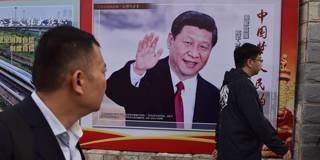For four decades, rapid economic growth was the prime imperative of China's communist leaders. President Xi Jinping, by contrast, is prepared to forego growth in the interest of cementing the Party's political power and pursuing his Chinese Dream of national rejuvenation.
NEW HAVEN – Since the days of Deng Xiaoping, economic growth has mattered more than anything for China’s leaders. The 10% annualized hyper-growth from 1980 to 2010 was widely seen as the antidote to the relative stasis of the Mao era, when the economy grew by only about 6%. But under President Xi Jinping, the pendulum has swung back, with 6.6% average growth from 2013 to 2021 much closer to the trajectory under Mao than under Deng.
Some of the slowdown was inevitable, partly reflecting the law of large numbers: Small economies are better able to sustain rapid growth rates. As China’s economy grew – from 2% of world GDP in 1980 at the time of the Deng takeoff to 15% when Xi assumed power in 2012 – an arithmetic slowdown became only a matter of time. The surprise was that it took so long to occur.
It is possible to quantify the foregone Chinese output from the slowdown. Had annual real GDP growth remained on the 10% trajectory under Xi, rather than slowing by nearly 3.5 percentage points since 2012, the Chinese economy today would be a little more than 40% larger than it is.

NEW HAVEN – Since the days of Deng Xiaoping, economic growth has mattered more than anything for China’s leaders. The 10% annualized hyper-growth from 1980 to 2010 was widely seen as the antidote to the relative stasis of the Mao era, when the economy grew by only about 6%. But under President Xi Jinping, the pendulum has swung back, with 6.6% average growth from 2013 to 2021 much closer to the trajectory under Mao than under Deng.
Some of the slowdown was inevitable, partly reflecting the law of large numbers: Small economies are better able to sustain rapid growth rates. As China’s economy grew – from 2% of world GDP in 1980 at the time of the Deng takeoff to 15% when Xi assumed power in 2012 – an arithmetic slowdown became only a matter of time. The surprise was that it took so long to occur.
It is possible to quantify the foregone Chinese output from the slowdown. Had annual real GDP growth remained on the 10% trajectory under Xi, rather than slowing by nearly 3.5 percentage points since 2012, the Chinese economy today would be a little more than 40% larger than it is.